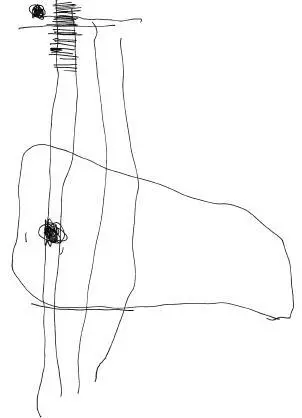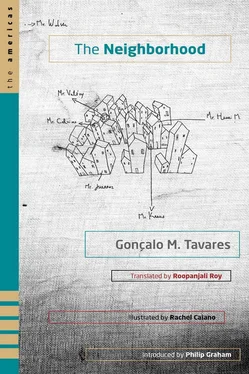“Yes, it’s uncommon, but …”
“See it more closely,” said the Assistant. “Bend over; you’ll see it better if you’re closer.”
The Boss contained his joy—“Really, what a thing, even my air stands out, what an extraordinary thing!”—and with his belly pressed against the upper part of the balustrade on the balcony, he continued to bend forward. He wanted to see what emanated from his most profound depths from close up.
“That’s it,” continued the Assistant, “when your exhalation comes down from above, something comes out there … an unusual authority!”
They were, as has been mentioned above, on the fourth floor. And it was then that it happened.
As he was in the middle of a compliment, the Assistant didn’t make it in time to prevent the tragedy. The Boss really wanted to see what the air he exhaled looked like when it blew out vertically, from top to bottom. So he bent farther forward. And even farther. And farther. And farther. And farther.
Until he didn’t have enough time to turn back.

1

Mister Walser was overjoyed! In the midst of bushes, wild plants, and other manifestations of nature, in the course of a full and unpredictable life, this was what he had managed to build — using all the specialized technical skills that only a great civilization is capable of providing — a simple house, nothing luxurious or ostentatious, a modest home in which to live, the house of Mister Walser, a man who, for the time being, was alone in the world, but someone who viewed this house that had finally been finished — how many years had it taken to build?! so many! — as an opportunity to, frankly speaking, find company at last.
If until then the absence of a closed, comfortable space, exclusively his, had been an insurmountable hurdle, now, surrounded by that all-pervading smell of newness that emanated from the wood, the paint on the walls, even the sound of the machines that were necessary for his domestic life as a single man living on his own, well, now, with the new house, everything seemed possible. For Mister Walser, his house was not merely a place that humanity had conquered from the surrounding forest, from the space that nonhuman things seemed to have claimed as their own — it was also an ideal landscape to begin to talk with other men — and he really felt the need to do just that.
Walser promised himself that he would always have the day’s newspaper. He was well aware that the geographical isolation of his house meant, essentially, maintaining the physical presence, and in a certain way also the spiritual presence, of human events alive. And this was an indispensable task, all the more so because Walser had refused from the very outset any possibility of installing any technical device that allowed access to images. Only the newspaper. Nothing more than that.
2

It is said that this expectation of creating a personal space where it was possible to simply talk with other men, argue, discuss large or small ideas, matters that are of interest to countries or continents and matters that are of interest only to the neighboring community, this underlying anxiety behind a rational climate of sociability, should not be confused with a stupid and unconscious surrender to the shapeless noise of a city. On the contrary, the site where he had decided to build his new house had not been chosen randomly. Situated a fair distance away from the closest neighborhood, the structure was surrounded, as has already been mentioned, by a concentration of nature that was not at all receptive to solitary walks, such was the impenetrable tangle of branches that sometimes seemed absolutely uncontrollable — almost as though they were demented. The possibility of larger objects passing through was even more remote. A mere shopping cart, for example, could use only a single possible trajectory to reach Walser’s house. And that single path, which was, at any given moment, not broader than two meters, had to be defended — as though it were a damsel — not every day, of course, but definitely (at least) every month, from the silent but exceedingly effective advances of the forest.
From a certain moment onward, when the road led only to his house, once he had passed all the crossroads, Walser was keenly aware that he could count on nobody but himself to defend the small patch of organized earth that the fine materials of civilization had built. Even though legislation clearly stated that this was not his personal responsibility, but rather the responsibility of the community, Walser was sufficiently (albeit not deeply) acquainted with the ways of men to not nurture exaggerated illusions. He had therefore already bought a fairly large axe, which was safely ensconced (almost hidden) in one of the hardest rooms to access in his house. For Walser, this object was an almost inexcusable infiltration of aggressiveness in a space — his space — that had been built precisely to attract the opposite: cordiality, a handshake between two men who reach an understanding after a long argumentative chat, an emotional hug of farewell, and, possibly, who knows — Walser still nurtured this hope — a passionate kiss, an encounter with his definitive soul mate.
3

Walser was overjoyed! As soon as he opened the door to his house, he felt as though he was entering another world. As though it was not just a physical movement in space — a mere two steps — but was also a far more intense movement in time. From the rear foot that still bore the scent of the earth and the feeling, completely irrational but one that nonetheless exists, that one is surrounded by living things that we do not entirely understand and which do not understand us — elements of the forest — the distance between that rear foot and the foot that is in front, which has already stepped over the threshold of the door, should never be measured in centimeters, but in centuries, perhaps millennia. When he closed the door behind him, Walser felt he was turning his back on an inhuman bestiality (from which, it is true, billions of years ago, a creature endowed with an uncommon intelligence had emerged — that solitary builder known as Man) and was plunging head-on into the effects that this schism between humanity and the rest of nature had caused; a house in the middle of the forest, this was an absolutely rational conquest.

4

The smell of a new house was everywhere! A well-polished floor made of a light-colored wood ran through all the numerous rooms in the house, and there were said to be so many rooms that Walser had lost count; it was excessive, no doubt, but how can one criticize someone who was so enthused by his own expectations, someone who made the most of a plot of land that nobody wanted to build as large a structure as possible? Who knows what the future holds, thought Walser during the moments when he planned more rooms; who can guess what will happen during our lives? In fact, he had not built that house for the solitary man that he was at that point in time. Frankly speaking, without going into detail, Walser had great hopes for the future.
Читать дальше















